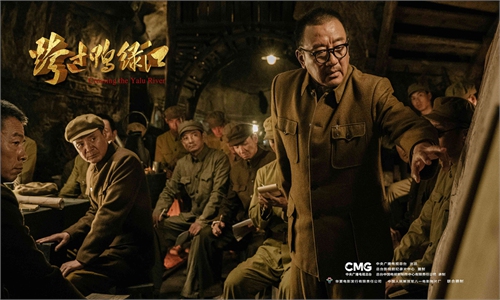ARTS / FILM
Sequel to Korean War movie most likely to top Chinese New Year's box office: insiders

The photo taken on December 30, 2021 shows movie posters at a cinema in Beijing. Photo: VCG
Two patriotic films, Water Gate Bridge and Snipers will hit Chinese cinemas simultaneously on the first day of the Chinese New Year with high expectations. Insiders said that mainstream movies will continue to rule the Chinese New Year film market in 2022.
On Thursday came the announcement on Sina Weibo that Water Gate Bridge will be released on February 1, making it the 11th film to be announced for the 2022 Spring Festival.
The movie is the sequel to the Chinese blockbuster The Battle at Lake Changjin, starring the original shooting team, telling the story of the Chinese Volunteer Army soldiers taking on a new task at the crucial "Water Gate Bridge" on the retreat route of American troops.
Based on statistics from Chinese online ticket platform Dengta, more than 40,000 moviegoers said they want to watch the film as of Thursday, and the number is expected to reach a new high.
On Taopiaopiao, another Chinese ticketing platform, the number of people who want to watch Water Gate Bridge reached 230,000. And Snipers, another movie inspired in the Korean War, attracted 129,000 potential viewers.
With the release of the two mainstream films, insiders said that it is "an inevitable trend for war movies to become a hit."
They also mentioned that the sequel to the Chinese blockbuster will "undoubtedly" top the box office for Chinese New Year movies, following The Battle at Lake Changjin's 5.8 billion yuan ($912 million) record in China' s movie market, setting a new record as the highest-grossing film in history.
"As a sequel, in addition to the high quality of production, the film meets the expectations of the current Chinese moviegoers in terms of the theme, especially under the current China-US relations," Shi Wenxue, a film critic based in Beijing, told the Global Times.
"Concerning the relations of the two countries where the US keeps coming up with cohesive strategies to confront China, the movie inspired by the War to Resist US Aggression and Aid Korea (1950-53) are inevitably favored by many Chinese moviegoers. Many entered the theater not only for the grand production and celebrities of the film, but also for the patriotic feelings of admiring the ancestors," Shi remarked.
Regarding the sequel, "the patriotic sentiment of people across the country will reach another peak amid the tense China-US competition," Shi said.
China's box office has surpassed the US' to become the world's largest in the past two years. Meanwhile, Hollywood fell into disfavor in the Chinese film market because of its distorted values of "political correctness" and improper use of Chinese elements in their films.
"It is not politics that drive the world's largest film market, but film quality and the taste of the audience," a film insider told the Global Times.



